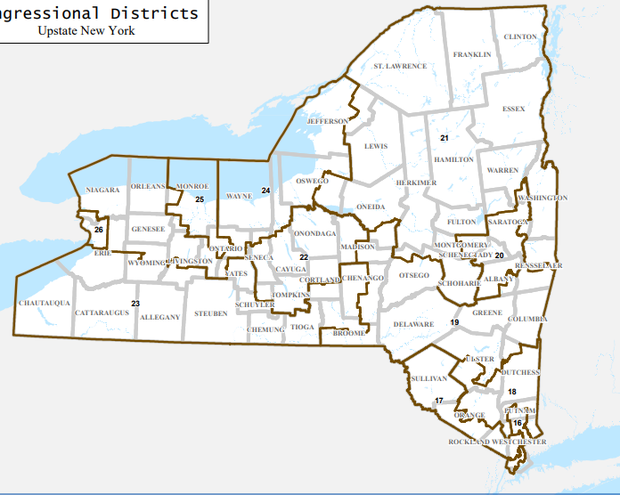New York court throws out congressional maps favoring Democrats
New York's highest state court ruled Wednesday that the legislature violated the state's 2014 redistricting reform by taking over the redrawing of its congressional lines and creating a map that heavily favors Democrats.
The 4-3 decision was made after a string of lower court decisions that ordered the redrawing of congressional boundaries. The court also ruled that the proposed state senate lines were unconstitutional.
During Tuesday's oral arguments, judges were skeptical that the Democratic-majority legislature had taken the right steps to take over the redistricting process from the independent redistricting commission (NYIRC), which was unable to produce a consensus congressional map.
"A stalemate within the IRC resulted in a breakdown in the mandatory process for submission of electoral maps to the legislature. The legislature responded by creating and enacting maps in a nontransparent manner controlled exclusively by the dominant political party — doing exactly what they would have done had the 2014 constitutional reforms never been passed," wrote Chief Judge Janet DiFiore.
The originally enacted congressional map was likely to create 22 Democratic-leaning districts and 4 Republican-leaning seats. The current congressional delegation is made up of 19 Democrats and eight Republicans.
The court order to redraw the map is a loss for House Democrats, who were otherwise were looking at the possibility of a small net gain in seats through aggressive redrawing of the lines in their favor in New York, Illinois and Oregon. Meanwhile, Republicans will see modest gains through recent gerrymandering in Florida that could give them four more seats and potentially in Missouri, where legislators are still redrawing lines.
"What we needed to do was to give Republicans the same tools in the courtroom that the Democrats have been using for the last couple of decades," said former New Jersey Governor Chris Christie, a co-chair of the National Republican Redistricting Trust."If I were a New York Democrat today, [Democratic Congressional Campaign Committee Chair] Sean Patrick Maloney in particular, I would be very despondent because whatever map is going to come out of this process is going to be a significantly worse map for them. The only reason for that is because they made the map they submitted and adopted, unconstitutionally good for them." he added.
The court ordered the congressional and state senate lines redrawn, and wrote that the primaries for those races will now likely have to be moved to August. It left the decision on the statewide primaries for governor and lieutenant governor up to the state board of elections and noted that New York "routinely held a bifurcated primary until recently, with some primaries occurring as late as September."
"We are confident that, in consultation with the Board of Elections, the Supreme Court can swiftly develop a schedule to facilitate an August primary election, allowing time for the adoption of new constitutional maps," wrote Difore.
While defendants for New York, such as Democrats Governor Kathy Hochul and state Senate Leader Andrea Stewart-Cousins, said during the oral argument that it's the legislative body that should correct the map, the court disagreed and said the maps "at this juncture, [are] incapable of a legislative cure." The court instead ordered that a special master appointed by the Supreme Court handle the maps and receive input from the legislature and "any interested stakeholders."
On Wednesday, a spokesperson for state Senate Democrats said they "disagree" with the decision, and "believe in the constitutionality of the Congressional and state legislative maps passed earlier this year."
"The State Senate maps in particular corrected an egregious partisan gerrymander and have not been overturned on the merits by any court. We will make our case to the special master appointed by the court," said Mike Murphy, a spokesperson for the state senate Democrats.





